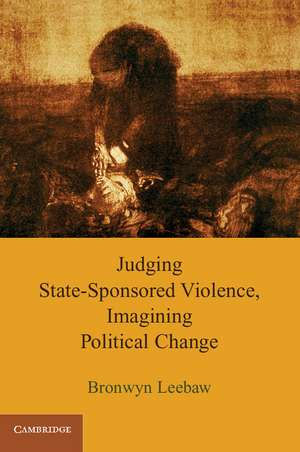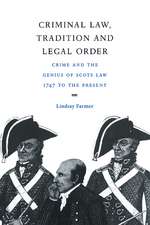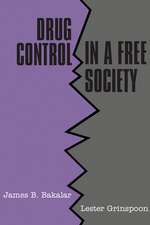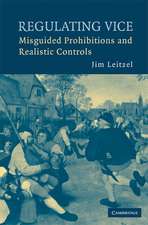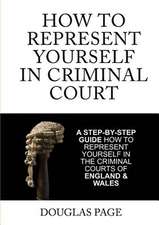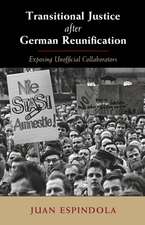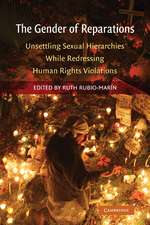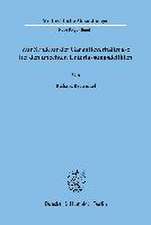Judging State-Sponsored Violence, Imagining Political Change
Autor Bronwyn Leebawen Limba Engleză Paperback – 17 apr 2011
| Toate formatele și edițiile | Preț | Express |
|---|---|---|
| Paperback (1) | 247.19 lei 6-8 săpt. | |
| Cambridge University Press – 17 apr 2011 | 247.19 lei 6-8 săpt. | |
| Hardback (1) | 547.37 lei 6-8 săpt. | |
| Cambridge University Press – 17 apr 2011 | 547.37 lei 6-8 săpt. |
Preț: 247.19 lei
Nou
Puncte Express: 371
Preț estimativ în valută:
47.30€ • 48.87$ • 39.35£
47.30€ • 48.87$ • 39.35£
Carte tipărită la comandă
Livrare economică 19 martie-02 aprilie
Preluare comenzi: 021 569.72.76
Specificații
ISBN-13: 9780521169776
ISBN-10: 0521169771
Pagini: 222
Dimensiuni: 152 x 227 x 15 mm
Greutate: 0.36 kg
Ediția:New.
Editura: Cambridge University Press
Colecția Cambridge University Press
Locul publicării:New York, United States
ISBN-10: 0521169771
Pagini: 222
Dimensiuni: 152 x 227 x 15 mm
Greutate: 0.36 kg
Ediția:New.
Editura: Cambridge University Press
Colecția Cambridge University Press
Locul publicării:New York, United States
Cuprins
1. Introduction: transitional justice and the 'gray zone'; 2. Human rights legalism and the legacy of Nuremberg; 3. A different kind of justice: South Africa's alternative to legalism; 4. Political judgment and transitional justice: actors and spectators; 5. Rethinking restorative justice; 6. Remembering resistance; 7. Conclusion: the shadows of the past.
Recenzii
"Judging State-Sponsored Violence, Imagining Political Change is a path-breaking interpretation of systematic political violence at a time when our need for one couldn't be greater. Bronwyn Leebaw examines how the thinking that initially informed the Nuremberg Tribunal and the South African Truth and Reconciliation Commission has evolved into a set of depoliticizing frameworks of interpretation ("human rights legalism" and "therapeutic restorative justice") that focus on individual guilt and trauma. Then, through a convincing extension of Hannah Arendt's concept of political judgment, Leebaw widens our angle vision so that it is not narrowly restricted to perpetrators and victims. Without depreciating their importance, she enables us to see more clearly the expanding "gray zone" of resistance and complicity that surrounds them. Leebaw provides a practice-driven theory of political judgment on a subject that others have tried to have the final word on from either a moral or legal perspective by avoiding politics and political judgments. She wisely reminds us that these attempts at depoliticization can only be successful in theory. To be useful in practice, political judgment must be at the center of any path to a more just political future, a path which unavoidably has to be followed one provisional judgment at a time, one step at a time. This book is a significant step in that direction."
- Stephen L. Esquith
Professor, Department of Philosophy
Michigan State University
"How to respond to episodes of atrocity? Bronwyn Leebaw's path-breaking work suggests that the same shortcoming hobbles two options: criminal courts and restorative truth commissions. Drawing from Nuremberg and South Africa, Leebaw contends that these options depoliticize justice through overripe notions of legalism. Counterintuitive, yet compelling, Leebaw argues that justice and memory should welcome -- rather than recede from -- politics. Her project is magisterially written, theoretically capacious, relevant, topical, courageous, and vivid. In short, a must read. "
- Mark A. Drumbl
Class of 1975 Alumni Professor
Director, Transnational Law Institute
Washington and Lee University School of Law
"Bronwyn Leebaw has written a superb book on a subject of fundamental importance: how we address state-sponsored violence. Her argument, built around an especially illuminating study and critique of the Nuremberg Trials and the Truth and Reconciliation process in South Africa, shows the achievements and limits of their approaches, and points to alternative strategies. Leebaw takes both institutions and their norms seriously, and her book masterfully weaves the two together to produce an account that is deeply informed by the realities of institutional settings and by the norms of justice that are bound up with them. This is a truly exceptional study!"
- J. William Booth
Department of Political Science
Vanderbilt University
- Stephen L. Esquith
Professor, Department of Philosophy
Michigan State University
"How to respond to episodes of atrocity? Bronwyn Leebaw's path-breaking work suggests that the same shortcoming hobbles two options: criminal courts and restorative truth commissions. Drawing from Nuremberg and South Africa, Leebaw contends that these options depoliticize justice through overripe notions of legalism. Counterintuitive, yet compelling, Leebaw argues that justice and memory should welcome -- rather than recede from -- politics. Her project is magisterially written, theoretically capacious, relevant, topical, courageous, and vivid. In short, a must read. "
- Mark A. Drumbl
Class of 1975 Alumni Professor
Director, Transnational Law Institute
Washington and Lee University School of Law
"Bronwyn Leebaw has written a superb book on a subject of fundamental importance: how we address state-sponsored violence. Her argument, built around an especially illuminating study and critique of the Nuremberg Trials and the Truth and Reconciliation process in South Africa, shows the achievements and limits of their approaches, and points to alternative strategies. Leebaw takes both institutions and their norms seriously, and her book masterfully weaves the two together to produce an account that is deeply informed by the realities of institutional settings and by the norms of justice that are bound up with them. This is a truly exceptional study!"
- J. William Booth
Department of Political Science
Vanderbilt University
Notă biografică
Descriere
Offers a new way to think about the legacies of two institutions - the Nuremberg Trials and South Africa's Truth and Reconciliation Commission.
